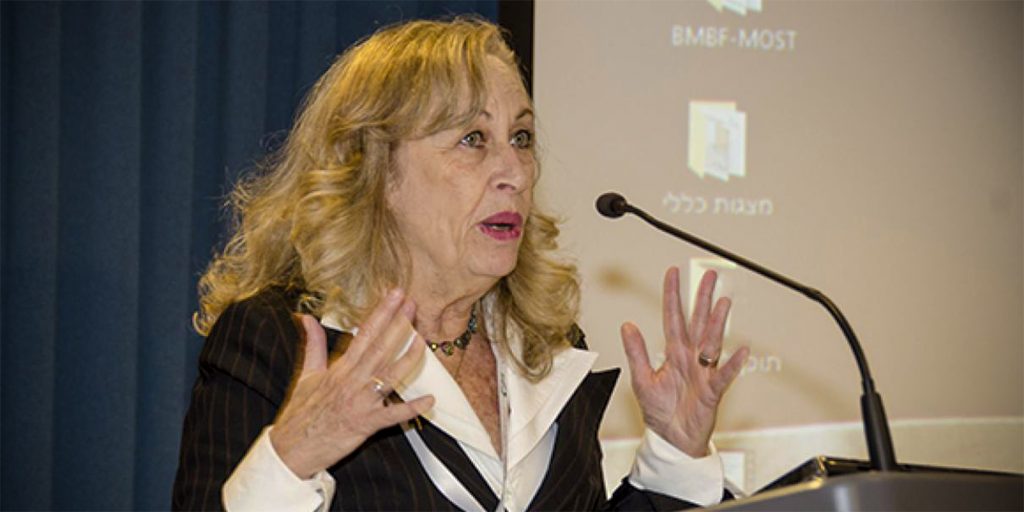 Dr. Mira Marcus-Kalish of Tel Aviv University
Dr. Mira Marcus-Kalish of Tel Aviv UniversityCARTA Distinguished Lecture Series
Medical Informatics – Promise and Barriers Towards Precise Medicine
Dr. Mira Marcus-Kalish
Director, International Research Affairs
Tel Aviv University
10:00 am-12:00 pm ET, Monday, 23 Nov. 2020
Online via Webex
The challenging time facing the pandemic forced us to relate to the human being’s broadband picture and his surrounding as one functioning system across countries and continents. The need is to relate both to the Micro (including in-body, physical, and mental conditions) and the Macro (such as environmental, cultural, and economic factors) providing a comprehensive understanding of the human body functioning in the surrounding, towards a precise, personalized “disease signature,” definition, especially these days. A systematic literature review on the “disease signature” term revealed no clear definition. In many articles, the “disease signature” phrase appears as a single biomarker (often genetic), mainly related to neurology or oncology. (Stemmer, A. at All, 2019. Journal of Molecular Neuroscience, 67(4)). The major goal is the unity of nature, science, and technology, from the nanoscale towards converging knowledge and tools, at a confluence of disciplines, as was envisioned by the NSF in 2001 (NBIC) and further at the joint EU-US WTEC effort “Converging of Knowledge, Technology, Society,” Roco et al., Springer 2013.
The COVID-19 global health emergency increased the need for early precise diagnosis and treatment while facing major physical and mental threat and stress, such as Post Traumatic Stress Disorder (PTSD). These understandings reemphasized the need to join all forces, converge, verify and embed all knowledge, expertise, and new advanced technologies in the various disciplines. Furthermore, it enforced to verify the data originated by various sources while bridging all cultural, conceptual, curation and technology barriers, preserving privacy and ethics regulations and ensuring reliable advanced analysis tools. All of the above provide profound insight into the human body and brain functioning in the surrounding and reliable “Disease Signature,” followed by suitable therapeutic treatment.
The question to be asked: Are we able to collect Big enough data, distributed and representative enough, while bridging all barriers and accurate analysis tools to ensure reliable, replicable, reproducible outcome towards precise, personalized medicine? The Brain Medical Informatics Platform (MIP), developed by the EU Human Brain Flagship Project, as part of the EBRAINS platform, is a key feasibility study along these lines. It involves broad clinical data collections from 30 hospitals, converging knowledge and data, embedding new technologies for data privacy, preservation, and curation, as well as sophisticated analysis tools. The MIP and EBRAINS framework goal is to identify “BRAIN Disease Signatures” towards reliable medical treatment. A 3C (Categorize, Classify, Cluster) Methodology, developed in our lab, is one of the tools available on the MIP. It incorporates expert medical knowledge and experience into the analysis process of disease manifestation and potential biomarkers towards reliable insights. The 3C approach was applied to the ADNI (Alzheimer’s disease Neuro Imaging) cohort, discovering association with new subtypes, which were later verified using the Rome Gemelli hospital labs clinical data. Other case studies were Parkinson’s Disease, genetic and biomarker research: (Tal Kozlovski, et al., 2019, Frontiers in Neurology, Movement Disorders), as well as PTSD research (Ben-Zion et al., 2020, Translational Psychiatry), both in collaboration with the Tel Aviv Medical Center. The COVID-19 global health emergency increased the need for early precise diagnosis and treatment while facing major physical and mental threat and stress, such as Post Traumatic Stress Disorder (PTSD). These understandings reemphasized the need to join all forces, converge, verify and embed all knowledge, expertise, and new advanced technologies in the various disciplines. Furthermore, it enforced to verify the data originated by various sources while bridging all cultural, conceptual, curation and technology barriers, preserving privacy and ethics regulations and ensuring reliable advanced analysis tools. All of the above to provide profound insight into the human body and brain functioning in the surrounding as well as reliable “Disease Signature”, followed by suitable therapeutic treatment.
Providing “Healthy Aging” to the elderly is a perfect example conceiving all, these days, as the elderly became one of the vulnerable groups at risk. The loneliness and isolation forced by the current pandemic results in severe conditions, including stress disorders and PTSD. Thus, an International “Healthy Aging” initiative was established at TAU, promoting broad interdisciplinary research, combining knowledge and data analysis as well as advanced technologies, from most areas of science: including economics, art, social sciences, mental and physical health, lifestyle, engineering, etc. All that to ensure the best fitted reliable treatment and a balanced quality of life to the elderly in general, and in these days, in particular.
Dr. Mira Marcus-Kalish is the Director of International Research Collaborations at Tel Aviv University. Her main areas of research are mathematical modeling, converging technologies, and data mining. Dr. Kalish holds a Ph.D. in Operations Research from the Technion, Israel Institute of Technology, where she developed one of the first computerized systems for electrocardiogram (ECG) diagnosis. Her postdoctoral training was at Harvard University, the MBCRR (Molecular Biology Computer Research and Resource) laboratory, and at the Dana Farber Cancer Institute. She was awarded her B.Sc. in Statistics and Biology from the Hebrew University of Jerusalem
The post talk: Medical Informatics – Promise and Barriers Towards Precise Medicine, 10am ET Mon 11/23, Webex appeared first on Department of Computer Science and Electrical Engineering.